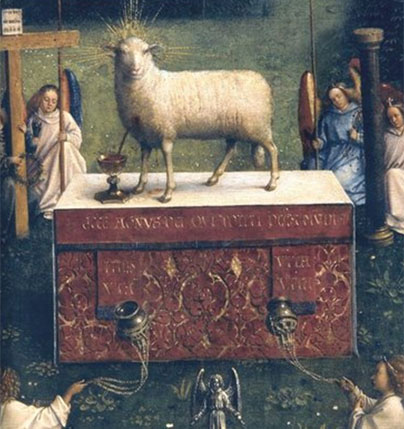Ein Lämmlein geht und trägt die Schuld
“A Little Lamb bears the Guilt/Sin/Pain/Hurt/Blame/Trespass of the World”
The German language is fascinating. I enjoyed the semesters of German I took in college, and I’m grateful that I had the opportunity to travel to Austria and Germany for music studies. As a classical musician, so much of our heritage comes from that part of the world, and so much of our religious history does too. In fact, they are tied together in many ways.
One of my favorite hymns is a Lutheran melody written by Wolfgang Dachstein and Matthias Greiter, An Wasserflüssen Babylon (trans. – On the Rivers/Waves of Babylon; 1525). Many great melodies are later set to different words. For example, this same melody is used to set the text by Paul Gerhardt, Ein Lämmlein geht und trägt die Schuld (1647). Schuld is a complex German word that carries many different connotations. I tried to capture a few of them in the translation in the title above (Guilt/Sin/Pain/Hurt/Blame/Trespass).
Other versions of the Dachstein/Greiter melody were set by Johann Sebastian Bach around 1725-1748. Bach used this melody in organ and vocal works, and he suggested using either the Wasserflüssen or Lämmlein text. I feel extreme sadness at the thought of a little innocent lamb taking on the sin of the world and bearing it gladly. God’s grace is something so great, and when we stop to appreciate the sacrifice of Jesus, we come closer to understanding the love He wants us to show one another.
Here are translations of the first verse of each of the two different texts.
At the rivers of Babylon, there we sat down right heavily; even when we thought upon Sion, we wept together sorrowfully. For we were in such heaviness, That we forgot all our merriness, and left of all our sport and play: on the willow trees that were there. We hung up our harps truly, and mourned sore both night and day.
A Lamb goes uncomplaining forth, the guilt of all men bearing; ’tis laden with the sin of earth, none else the burden sharing: it goes its way, grows weak and faint, to slaughter led without complaint, its spotless life to offer; bears shame, and stripes, and wounds, and death, anguish and mockery, and saith, “All this I gladly suffer.”
– Logan Fish, Director of Arts Programming & Edmond Campus Director of Hospitality



